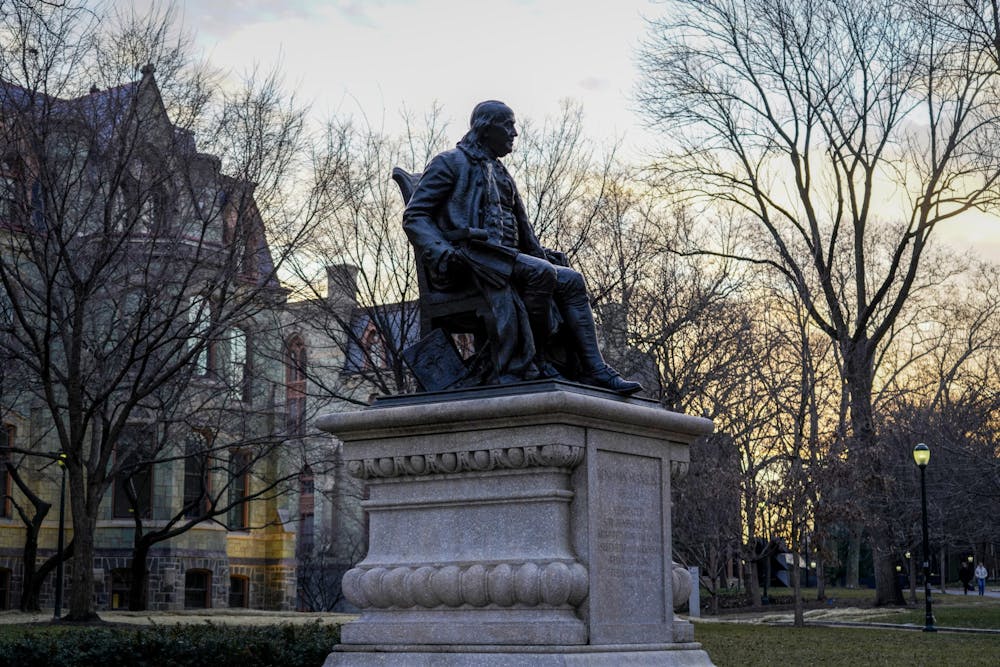
Guest Columnists Amy Offner and Sam Layding urge Penn faculty to resist the administration’s compliance with executive orders.
Credit: Grace ChenAs dangerous and illegal executive orders rain down on all of us who work at Penn, the need for collective action has never been more urgent — and our shared interests have never been clearer. The Trump administration is taking aim at life-saving biomedical research and healthcare; it is attacking the freedom to teach and learn about subjects from climate science to African American history; and it is threatening the safety, human dignity, and futures of our colleagues, coworkers, students, and patients who are immigrants, transgender, LGBTQ+, and people of color.
The Penn administration has chosen the path of anticipatory obedience. But we are encouraged by the resolve among our colleagues who recognize that it’s up to us to push back together, acting in solidarity with each other, our students, our patients, and our communities.
Over the last month, Penn employees across the University and hospital system — medical residents, tenure-track and non-tenure-track faculty, graduate workers, postdocs, museum workers, and library workers representing seven campus labor organizations — have come together to formulate a unified set of demands of the Penn administration. We invite everyone who works at Penn to sign in support, spread the word, and be ready to turn out and stand up for the following principles:
1. The Penn administration must uphold research and counteract federal funding cuts. The administration must provide stopgap funding to guarantee, at a minimum, that Penn affiliates affected by federal funding cuts retain their jobs and are paid on time. Penn can likely do more than that, and it should.
All of us who work at Penn deserve a voice in determining where that stopgap funding comes from. In recent weeks, amid NIH funding cuts, administrators at the Perelman School of Medicine and the School of Arts and Sciences have unilaterally ordered faculty to slash graduate admissions by 35% and rescind 18 offers already made, arguing that their only option is to compromise Penn’s core research and teaching mission. They have provided no evidence to convince us. The administration projects that NIH cuts could cost $250 million. Penn could cover that cost on a temporary basis by raising the spending rate on the endowment from 5% to 6.12%. It could cut the salaries of top-paid administrators and fund managers; it could fundraise; and it could reconsider its priorities. Why did the University Board of Trustees just authorize $13 million for a parking garage at the Pennovation Works while administrators are cutting graduate programs? This allocation of funds speaks volumes about what Trustees believe is important to our campus community.
Stopgap funding at Penn will improve the health of every person in the country. Penn researchers have produced life-saving breakthroughs including mRNA vaccines, and Philadelphia’s teaching hospitals train 1-in-6 doctors in the United States. It is also a winnable demand. When the COVID-19 pandemic began, administrators unilaterally imposed austerity policies: layoffs, furloughs, and freezes on hiring, graduate admissions, and pay. But in response to sustained pressure, the University quietly raised the rate of endowment spending from 5% to 7%. Today, administrators will tell you that they were far-sighted. In fact, organizing worked.
Penn is in the unusually privileged position that, unlike many other research universities, it has the resources to take this kind of immediate action in the short term. It must leverage its wealth to sustain its core mission while pushing back politically against these federal cuts.
2. The Penn administration must uphold its 2016 sanctuary policy and the rights of immigrant faculty, staff, and students. That means not cooperating with federal law enforcement or immigration authorities unless explicitly, legally compelled to do so. It means providing employees and staff with know-your-rights training, legal services, and private spaces on campus that ICE cannot enter without a judicial warrant. Other universities have taken such steps already.
3. There must be no anticipatory obedience on diversity, equity, inclusion, and accessibility. While Penn administrators have been ordering us to scrub websites and censor academic programming, other universities and our own unions have resisted and scored some early victories. Penn must restore policies, websites, and programming that were in place to make the University accessible to all before Donald Trump’s executive orders. It must retain and support the employees whose work is being targeted — not censor us. And future decisions on these issues must be made by the affected members of the University.
4. The University must maintain equal treatment for transgender and LGBTQ+ members of our community. Penn’s health system must continue to provide gender-affirming healthcare, and the medical and nursing schools must continue to train students to care for LGBTQ+ patients. Penn must continue to provide comprehensive medical coverage to all LGBTQ+ employees and students. And everyone must have access to bathrooms and changing rooms that align with their gender identities.
These demands of Penn administrators go hand-in-hand with demands that we, our coworkers, and our unions are making at the national level as we press for the restoration of federal research funding, file lawsuits challenging Trump’s executive orders, and mobilize for mass action nationwide.
If there is anything to be hopeful about, it is that those of us who work at Penn are better organized than ever. Over the last five years, our campus has seen a rebirth of labor organizing, with five successful union drives reshaping power relations at Penn — the largest employer in Philadelphia. Labor organizing has been a way to win a voice in decisions that affect our lives and those of our students, patients, and community, to stand up for basic principles of justice, and to hold the Penn administration to account. It has produced results. Graduate workers overcame COVID-19-era austerity policies and were certified as the largest private-sector union in our city’s history. Now, they are bargaining for a transformative contract that will guarantee nondiscrimination, a living wage, and institutional protections for international graduate workers. Museum workers fought hard for a contract that protects diversity in hiring and intend to enforce it.
This is a time to make your voice heard and to build the wall-to-wall organization we need to defend our democracy, our coworkers and communities, and the very possibility of research, teaching, and healthcare that serve the public good. If you work at Penn, we invite you to sign your name to these four principles, talk to your coworkers about them, and get ready to stand up for them together.
AMY OFFNER is an associate professor of History and president of AAUP-Penn. She can be reached at offner@sas.upenn.edu.
SAM LAYDING is a Ph.D. candidate in chemical and biomolecular engineering and a member of the GETUP-UAW bargaining committee. They can be reached at slayding@seas.upenn.edu.
The Daily Pennsylvanian is an independent, student-run newspaper. Please consider making a donation to support the coverage that shapes the University. Your generosity ensures a future of strong journalism at Penn.
Donate












